- Home
- Brandon Sanderson
White Sand Page 4
White Sand Read online
Page 4
Khriss didn’t respond.
“You know,” Baon said, leaning back against the wale to look out over the waters. “You shouldn’t have put me in charge.”
Khriss frowned. Sometimes Baon’s bluntness still took her by surprise. “What do you mean?”
The large man nodded to his side, where she briefly caught sight of the three younger soldiers giving him—and Khriss—unveiled bitter looks.
“They don’t like me,” Baon informed frankly.
“They don’t have to like you to follow your orders,” Khriss responded.
“True,” Baon agreed. “But they resent me as well. Technically all three outrank me. They’re noblemen; I’m not. I’m also a foreigner.”
“You’re older than they are, you’re more experienced than they are, and you are a better leader,” Khriss replied. “Even after travelling with you for a month, I knew that much.”
“I’m also a mercenary,” Baon said, folding his arms.
“Well, so is every soldier, in a way,” Khriss argued.
“Duchess,” Baon said tolerantly, “you have a quick tongue, but, despite what politicians and scholars claim, arguing cannot change facts. Those men resent me. You should have let their natural ranks determine who would lead when Captain Deral died.”
Khriss turned away from him, instead focusing on the approaching cliffs. She was not accustomed to being contradicted—but she knew Baon was probably right. She had made a mistake. Of course, it had seemed logical at the time. Baon’s wise bluntness had impressed her from the first time they met months ago when the expedition had begun.
“Don’t berate yourself,” Baon said from beside her, leaning against the gunnel. “You’re young yet—barely as old as those boys. In fact, I’d guess you’re younger.”
He paused eyeing her to see if she corrected him which, unfortunately, she couldn’t do. She hated it when people realized how young she was.
“You’ll learn.”
Khriss bowed her head, nodding to herself. Giving orders to the maids who brought her lunch was quite a bit different from organizing and heading an expedition to another continent. Shella! What delusion ever persuaded me to try something like this? I should have listened to the King. Gevin will be all right—for all I know, we crossed each other in the ocean. I’ll probably return from this fiasco to find him strutting about the court, laughing to himself about his silly fiancée.
Yet, even as she thought such things, she knew that in this case her optimism was unfounded. Three years was too long. If Gevin were coming home on his own, he would have done so by now. If he were still alive … .
Stop it! She warned herself. That won’t get you anywhere either.
“Should I go wake the others?” Baon asked beside her, providing a welcome distraction from her thoughts.
“They’ll probably want to see this,” Khriss agreed.
The large man nodded, turning back across the deck to climb down to the lower cabins. Khriss was left alone with the three noblemen, whose faces now betrayed none of their earlier looks of resentment.
Do they dislike me too? She wondered. I am the one that put Baon in charge of them. Even more than her decision to cross the Border Ocean, she was beginning to wonder if she had been wrong to assume she could be a leader of men.
#
“I suppose that thing is going to be there the entire time we’re on Dayside,” a slow, droll voice said from behind her. Khriss turned to see two men climbing out onto the deck. One was glancing up at the sun overhead.
“It doesn’t appear to move, Cynder,” she replied with a slight smile.
The speaker, an older man with barely a few wisps of hair clinging to the top of his otherwise bald head, stepped onto the deck, shading his already spectacled eyes. “Well,” he said in his unhurried voice, “I suppose I would have been disappointed if there weren’t some light to be found over here. The legends do say a great deal about that point, don’t they?”
Khriss couldn’t help smiling at the linguist’s voice. Professor Allstren Cynder, sixty-years old with a liver-spotted cranium to prove it, had been one of her teachers during the years of her university schooling. He had a dry, almost cynical way of speaking that was always unrushed and somewhat melodramatic. He would draw out some words just a second longer than natural, and force his voice into a monotone that was easily mistaken for disinterest. At the same time, however, there was a twinkle in his eyes, a clue that his solemn façade was just a clever way of laughing at the world and anyone foolish enough to take it too seriously.
“My lady Khrissalla,” he said, strolling over to stand beside her, offering a simple, but proper, bow, “you appear to have had a poor night—woke up on the wrong side of the ocean, I suppose.”
“By the Divine,” the second man exclaimed, giving Khriss a quick bow. “The adventure finally begins!”
Jon Acron, anthropologist, was a stoopy man of about five feet, though when it came to body mass, Acron’s sizable paunch more than made up for his lack of height. He wore the long mustache over a goatee that was the current style in Elis.
Acron stood excitedly beside the wale, his attitude a sharp contrast to Cynder’s soft dignity. Acron was practically jumping up and down with excitement—Khriss had constantly been amazed at Acron’s energy. He was overweight and well into his fifth decade, but in many ways he acted with the energy of a child.
Both anthropologist and linguist were dressed formally—they had obviously taken more time getting ready than she had. They wore suits after the fashion of their rank, with vests and matching collarpieces. The long-tailed jackets had wide, drooping sleeves, and Cynder had added pocketwatch and wristchains, as was his custom. Behind the two stood Baon, who had donned a functional knee-length jacket to obscure the two pistols at his hips.
Seeing the jacket reminded Khriss of just how hot she was. She had assumed that perhaps she would get used to it, but so far she’d had no luck. Her clothing, which had seemed so reasonable in her shaded cabin, now felt sweltering.
Acron wasn’t doing much better. In fact, the overweight man had already taken to wiping his face with a handkerchief. At the rate he was sweating, he would likely run out of dry kerchiefs before a few hours had passed.
“By the Divine, this is a dour place, isn’t it?” Cynder commented.
“I’d think you would be excited, Cynder,” Acron said, wiping his enthusiastic face with a handkerchief. “After all that studying you’ve done, now you finally get to visit.”
“I studied the language, not the sun, dear man,” Cynder noted, rolling his eyes and chuckling softly to himself at some joke that only he could understand.
“When do we dock?” Khriss wondered. The land was close enough now that she could see a town crouching on one of the slopes.
“In about an hour,” Baon replied, leaning against the foremast. “Those cliffs taper a bit to the east, and that’s apparently where our town is.”
Acron shot Baon an uncomfortable look—the anthropologist always seemed nervous around Baon for some reason. Khriss looked in the direction Baon had indicated, searching for signs of a town. They probably wouldn’t arrive for some time. None of them went down below, however, despite the heat.
#
Cynder lowered the spyglass. “It appears as if we were correct in our hypothesis.”
“Let me see, man,” Acron said, snatching the spyglass and putting it up to his eye.
Khriss turned from the overweight anthropologist to raise an eyebrow at Cynder.
“About their culture, my lady,” Cynder explained. “I see little evidence of advanced technology.”
“I concur,” Acron agreed. He was scanning the city as the boat slid into the city bay. “No sign of … wait, there’s a man carrying a bow. They’re definitely still in the sword-age. Poor fellows.”
“I can’t help thinking you should say poor us,” Cynder mumbled, reaching up to scratch the side of his head.
“Why?” Khriss won
dered, taking the spyglass from Acron.
“From the looks of things, your soldiers seem to have discovered a couple of pistols,” Cynder said. “However, despite such and obvious advantage, the Elisian military is not known for its … martial superiority. I can’t help wondering how we’ll fare against the natives.”
Khriss shot a look at Baon.
“He has a point,” the warrior said, then nodded to Flennid and the other two noblemen standing a short distance away. “I’ve seen you Elisians fight. Your military is more a tool for the pampered to dispose of their offspring than a true defensive army. Your country remains independent through clever politics, superior technology, and the fact that it’s so small no one wants to conquer it. Those three will be practically useless against a well-trained squad of natives, pistols or no pistols.”
The ‘useless’ comment didn’t gain Baon any ground with Flennid and the others, who were just within earshot. Honesty is one thing, Baon, but there’s also something to be said for tact.
“We’re in a foreign land, Baon,” Khriss said in reemphasizing her earlier stance. “An ocean away from civilization. If this expedition turns violent, I doubt all the muskets in Elis could save us. You soldiers were more to get us through Dynastic blockades than to protect us from Daysiders.”
Baon nodded in agreement, and Khriss turned to scan the city. Cynder was definitely right—the population looked considerably less-advanced than what she was used to. The houses were simple clay brick for the most part, and though the streets were cobbled in places, the stones were uneven and cracked. Most of the vehicles were simple carts, rather than fine carriages, and none of the buildings had glass in the windows.
There were other differences besides the level of technology. Notably absent were the lantern-poles that lined every street in her homeland; but, of course, such wouldn’t be necessary with the sun’s constant light. The greatest difference by far, however, were the beasts of burden. Up until the point that she looked through the spyglass, Khriss had discounted the stories of strange monsters living in the deserts of Dayside. Now, however, she was forced to reconsider.
They were black in color, and the light reflected off their shiny skin. They were proportioned something like a horse, but with shorter legs and a stumpier neck. Her first inclination was to think they were reptilian, but that was wrong. Their bodies seemed to be composed of plated segments, something like an insect, but they were proportioned nothing like bugs. More like the armored war-horses that the Dynasty sometimes employed.
Most disconcerting were their faces. They were covered with horn-like protrusions that stuck out in random directions. Each creature was different; some had only a couple, others were covered with dozens, and still others only had one massive spike sticking out like an overgrown nose.
Amazed, she lowered the spyglass and handed it to Baon. “They must be cosmetic,” she mumbled.
“What’s that, my lady?” Cynder asked.
“The horns. They must be used to frighten rivals; many of them look too weak to be used for combat.”
“Everything must have an explanation, I suppose,” the old linguist said, lounging back against the gunnel with a quiet chuckle.
“I am a scientist, Cynder,” she explained. “We explain things.”
“I thought you were a duchess.”
“Last I checked, the two weren’t mutually exclusive.”
Cynder nodded in agreement, but was still chuckling to himself.
“You’re going to have to find some dresses,” Baon noted, lowering the spyglass from his spectacled eye.
“What?” Khriss asked, turning.
“Look at the women,” Baon said, handing the glass back. “They wear dresses and keep their hair tied up under hoods. Most Darkside cultures don’t look favorably on women who dress like men, and I suspect it’s the same over here. So, you should find some dresses.”
“I have dresses,” Khriss mumbled testily, taking the spyglass back, though they were close enough now that she barely needed it. Baon was right, of course. Every woman visible, even the children, had her hair tied up and kept under a hood-like cloth. They wore one-piece dresses—actually, they fit more like robes—that were loose around the waist, and the styles didn’t seem to vary much. The men also wore loose-fitting robe, though they kept theirs tied at the waist, and many wore two layers of clothing—a shirt and skirt-like item underneath with an open-fronted robe over the top. All of the clothing was much more drab than she was used to, the pervading colors white and tan.
“This is going to be so exciting!” Acron said, his chubby head darting from side to side as he tried to take in everything at once.
She lowered the spyglass as the ship docked. “Well, Cynder, I guess we’ll soon find out how much the language has changed over the last five hundred years.”
Cynder frowned slightly, nodding to himself. The only texts they had from dayside were five centuries old. Courses in daysider language were popular in the university, and Cynder was one of the experts, but underneath all of the postulation and studying was the knowledge that to darkside, at least, daysider was a dead language. They really had no clue how to pronounce the words.
She had resisted bringing Cynder on the expedition because of his age. However, he was Elis’s premier authority on linguistics—the only other competent man, his assistant Wilheln, had gone with Gevin two years before. So, she had reluctantly agreed to bring Cynder on the expedition. In a way, she was glad he was along—his wry humor lightened her mood. However, she worried that the expedition would prove too much for him. Cynder was much better suited to a lecture hall than a daring exploration.
But, so are you, Khriss, she reminded herself. You’ll both just have to do what you can.
“Let’s go,” she said as the sailors put down the plank. There was only a hint of a tremble in her voice.
#
“Iresha’takasha Ai’Dakasha Lri’Heesth’Ker’Naisha ‘Totar.” Cynder said the words, then smiled hopefully.
The Daysider frowned at Cynder, his eyes wide. He scuttled away immediately, as if in fear. They were an odd-looking people. Their skin was different than her own—it wasn’t completely white, like darksiders from the eastern countries, but it was definitely paler than her own.
There seemed to be two races of them. Some had skin that was a little pale, kind of a dark tanish color. The rest of them had odd olive-colored skin that was a bit darker than the others, but still different from anything in Khriss’s experience.
Khriss sighed watching the daysider Cynder had approached move through the crowd, shooting them distrustful looks.
“This isn’t working,” she noted unnecessarily.
“I don’t know what it is, My Lady,” Cynder said with a frown. “At first, it seems like they might understand me—some of them, at least. They always run off, however.”
“I know,” Khriss said. Confusion she had expected—the language had probably changed dramatically over the last five centuries. But fear? It didn’t make sense.
They stood a short distance from the docks—they had been careful to keep the ship in sight, though what good that would do Khriss didn’t know. They were obviously in a market of some kind, mostly composed of one-story clay buildings with colorful tent-like drapings providing shade. The Daysiders, in general, paid Khriss and her companions little heed, streaming past the small clump of Darksiders with indifference.
Khriss found their lack of interest odd. She would have expected more … trepidation. She obviously wasn’t from Dayside—not only was her skin the wrong color, but her dress was such a bright shade of green that made the shop-tents looked wan by contrast. It was one of her favorite dresses, sleek and form-fitting, unlike the bulky Daysider ones. However, standing amidst the people, looking at their functional outfits and general disregard for flamboyancy, she was suddenly self-conscious.
Still, despite her oddity, the only looks she got were at her chest—which likely had little to do w
ith her nationality and more to do with the dress’s low neckline.
And Esra told me I dress too conservatively! She thought with amusement, remembering a conversation just a few months previously. Of course, that had been on Darkside.
“Well, it’s comforting to know one thing, at least,” Cynder commented after making another failed attempt at speaking with a passerby.
Khriss looked up with curiosity.
Cynder smiled. “It would have been tragic if we could actually speak the language,” the scholar explained. “It would have destroyed my reliance on the frivolous nature of higher learning. Some universal constants just have to remain unchallenged.”
“Perhaps it’s our accent,” Khriss said, shaking her head at Cynder’s sarcasm.
“But, they reacted the same way to written phrases,” Cynder reminded. “By the way, you might want to keep an eye on him.”
Khriss followed Cynder’s gesture. Acron had wandered away from them, and was poking through a shopkeeper’s wares with wide, eager eyes. He didn’t seem to care that they couldn’t communicate—the sheer joy of being in another culture was enough for him.
Of course, it made sense. The Dynasty strictly controlled travel on darkside. Even though Elis wasn’t part of the Dynasty, most of the surrounding countries were, and that made it difficult to actually visit other cultures—a frustrating situation if one were an anthropologist. Every year or so, Elis was able to trade for some Dynastic travel passes, and Acron usually managed to secure one of those. Even still, his visits to Dynastic countries would have been strictly controlled. She could understand Acron’s excitement to immerse himself in a new culture without Dynastic officials watching over his shoulder.
“That man is a fool.”
Khriss looked up at Flennid’s hissing voice. Baon had left the other two soldiers behind on the ship, bringing only Flennid to guard them. The younger man was watching the passing crowd with suspicion, frowning and shying back whenever one of them got too close to him. His hand kept straying to his pistol.
Beside her, Baon was frowning, but not at Flennid. He was regarding Acron.

 Steelheart
Steelheart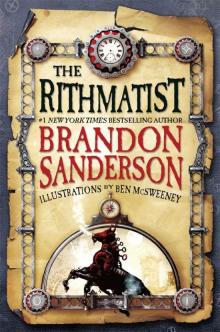 The Rithmatist
The Rithmatist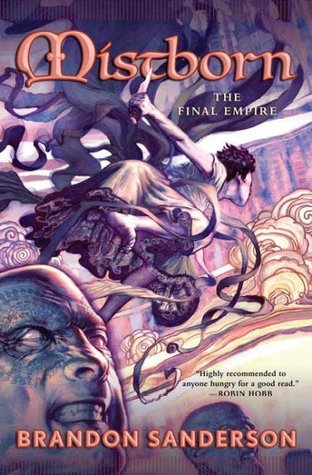 Mistborn: The Final Empire
Mistborn: The Final Empire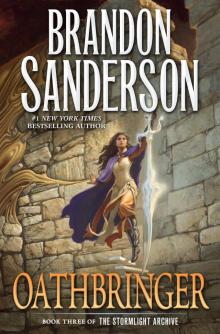 Oathbringer
Oathbringer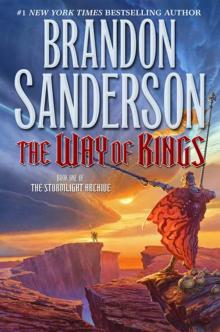 The Way of Kings
The Way of Kings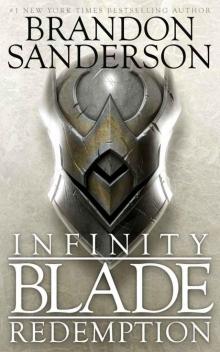 Redemption
Redemption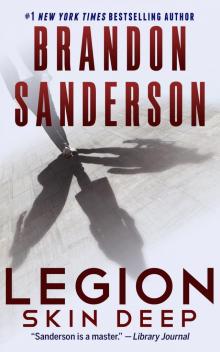 Skin Deep
Skin Deep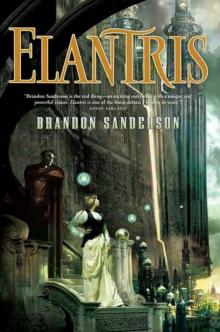 Elantris
Elantris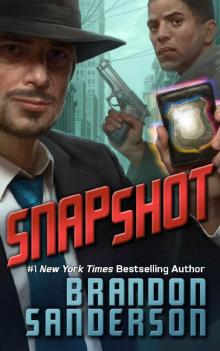 Snapshot
Snapshot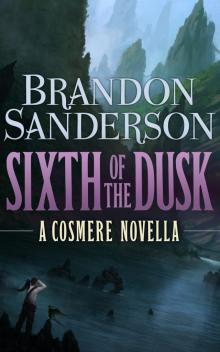 Sixth of the Dusk (Cosmere)
Sixth of the Dusk (Cosmere)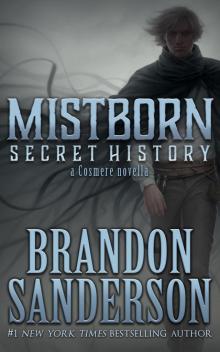 Mistborn: Secret History
Mistborn: Secret History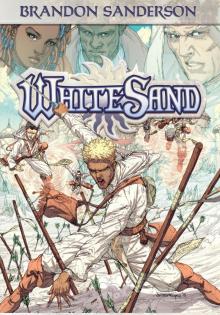 White Sand, Volume 1
White Sand, Volume 1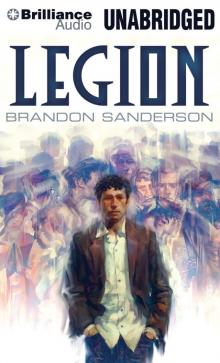 Legion
Legion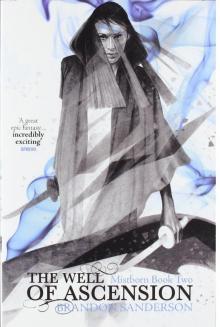 The Well of Ascension
The Well of Ascension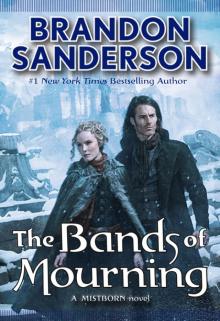 The Bands of Mourning
The Bands of Mourning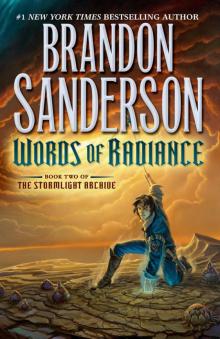 Words of Radiance
Words of Radiance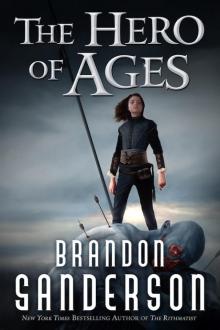 The Hero of Ages
The Hero of Ages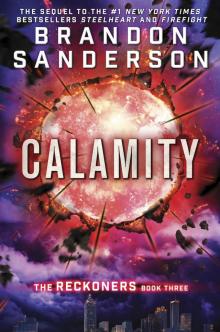 Calamity
Calamity Alcatraz Versus the Scrivener's Bones
Alcatraz Versus the Scrivener's Bones The Alloy of Law
The Alloy of Law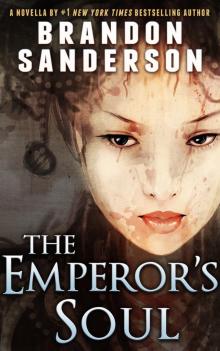 The Emperors Soul
The Emperors Soul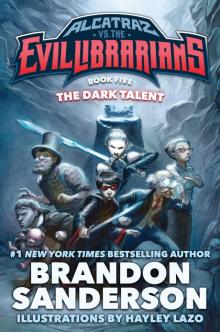 The Dark Talent
The Dark Talent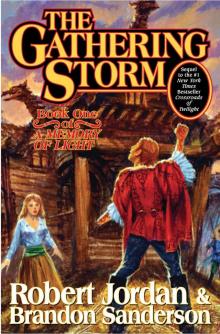 The Gathering Storm
The Gathering Storm Alcatraz Versus the Shattered Lens
Alcatraz Versus the Shattered Lens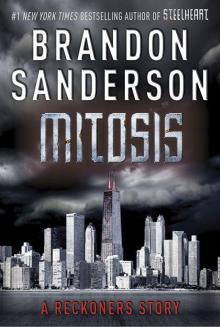 Mitosis
Mitosis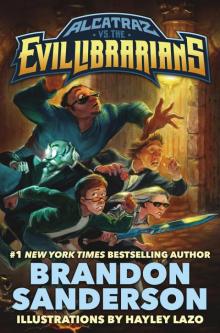 Alcatraz vs. The Evil Librarians
Alcatraz vs. The Evil Librarians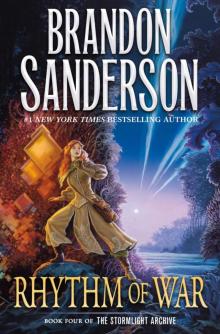 Rhythm of War (9781429952040)
Rhythm of War (9781429952040)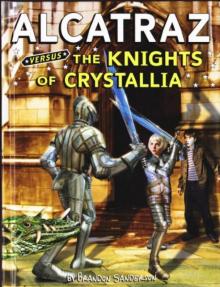 Alcatraz Versus the Knights of Crystallia
Alcatraz Versus the Knights of Crystallia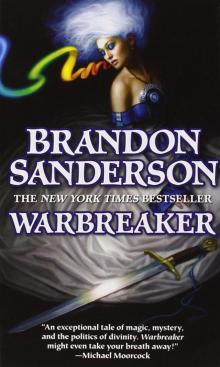 Warbreaker
Warbreaker Firstborn
Firstborn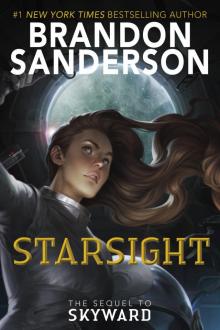 Starsight
Starsight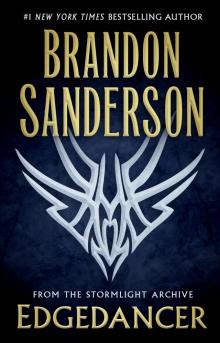 Edgedancer
Edgedancer Perfect State
Perfect State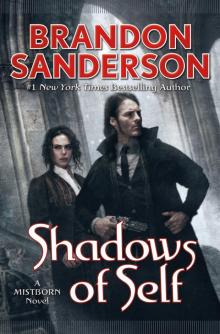 Shadows of Self
Shadows of Self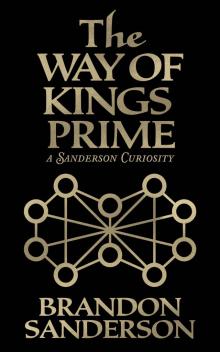 The Way of Kings Prime
The Way of Kings Prime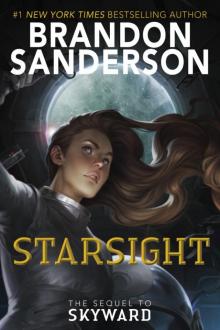 Starsight (US)
Starsight (US)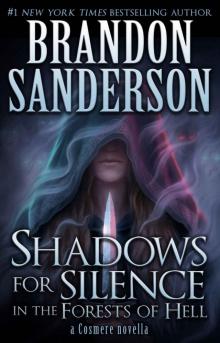 Shadows for Silence in the Forests of Hell
Shadows for Silence in the Forests of Hell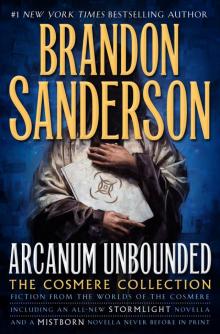 Arcanum Unbounded: The Cosmere Collection
Arcanum Unbounded: The Cosmere Collection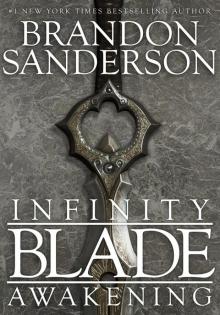 Awakening
Awakening Firefight
Firefight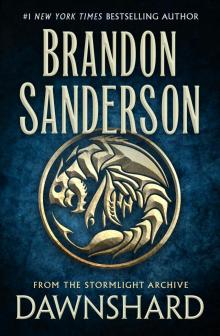 Dawnshard
Dawnshard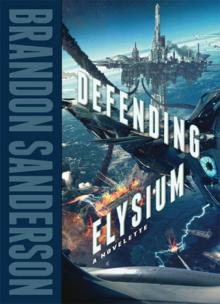 Defending Elysium
Defending Elysium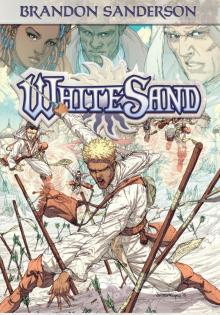 White Sand
White Sand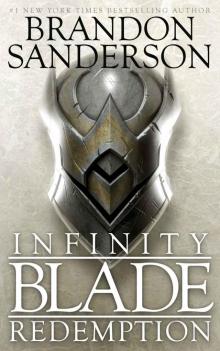 Infinity Blade: Redemption
Infinity Blade: Redemption The Final Empire
The Final Empire Skyward
Skyward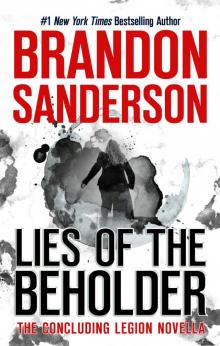 Lies of the Beholder
Lies of the Beholder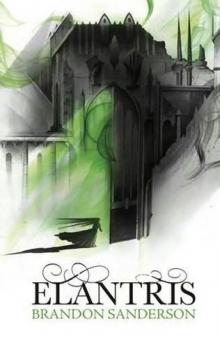 Elantris e-1
Elantris e-1 Steelheart r-1
Steelheart r-1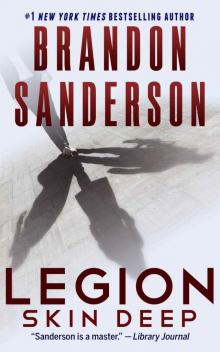 Legion: Skin Deep
Legion: Skin Deep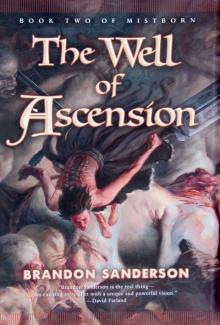 Well of Ascension
Well of Ascension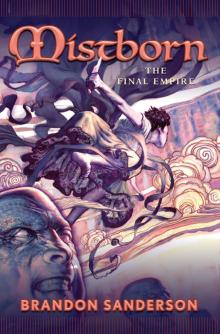 Mistborn
Mistborn Alcatraz versus the Evil Librarians
Alcatraz versus the Evil Librarians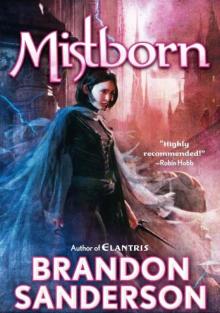 The Final Empire m-1
The Final Empire m-1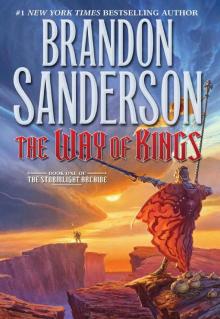 The Way of Kings (Stormlight Archive, The)
The Way of Kings (Stormlight Archive, The)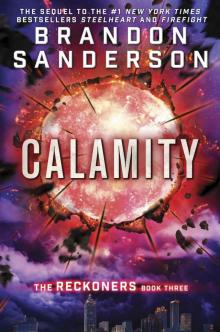 Calamity (The Reckoners)
Calamity (The Reckoners)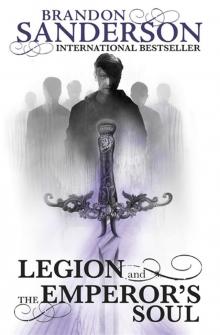 Legion and the Emperor's Soul
Legion and the Emperor's Soul Legion: The Many Lives of Stephen Leeds
Legion: The Many Lives of Stephen Leeds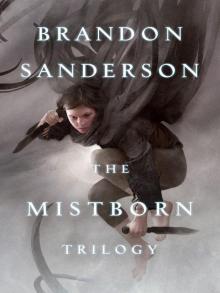 The Mistborn Trilogy
The Mistborn Trilogy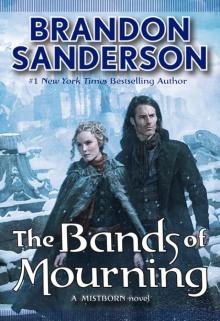 Bands of Mourning
Bands of Mourning Alcatraz
Alcatraz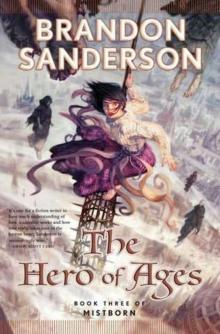 The Hero of Ages m-3
The Hero of Ages m-3 Alcatraz vs. the Shattered Lens
Alcatraz vs. the Shattered Lens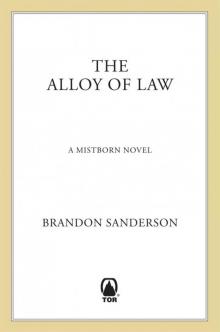 The Alloy of Law: A Mistborn Novel
The Alloy of Law: A Mistborn Novel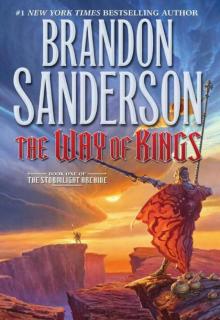 The Way of Kings sa-1
The Way of Kings sa-1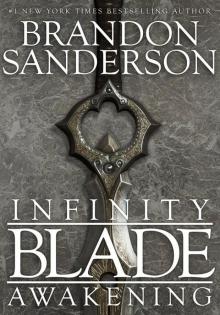 Infinity Blade: Awakening
Infinity Blade: Awakening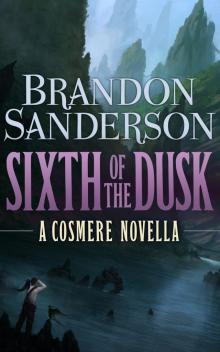 Sixth of the Dusk
Sixth of the Dusk The Stormlight Archive
The Stormlight Archive The Aether of Night
The Aether of Night